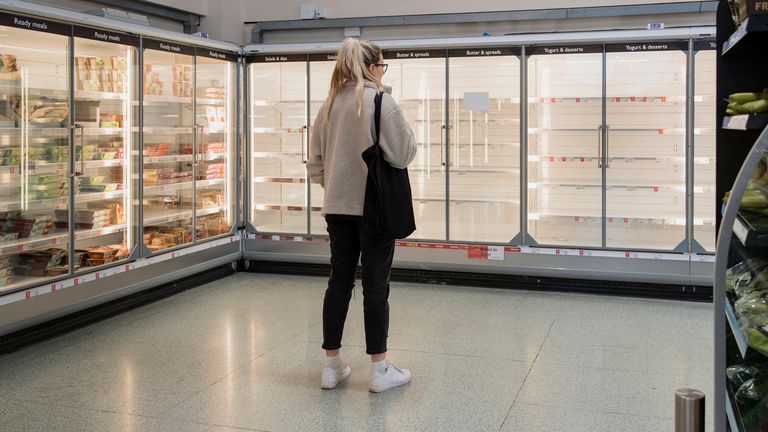Shoppers could start noticing food shortages within days due to the crisis in carbon dioxide (CO2) supply, a food industry chief has warned.
CO2 is used in food packaging, as well as a method of stunning animals prior to slaughter – but now supplies are running low.
Surging energy costs have resulted in the suspension of operations at fertiliser plants – which produce CO2 as a by-product – having a knock-on effect on the food industry.
Why gas prices have soared and left UK facing prospect of food shortages
Consumers could start noticing shortages in poultry, pork and bakery products within days, according to Ian Wright, the chief executive of the Food and Drink Federation.
He said the government needed to support fertiliser producers, help food producers to look for alternatives to CO2, and address labour shortages in the industry.
AdvertisementMr Wright said the crisis comes on top of Brexit-related issues and a shortage of lorry drivers.
“We have been saying for several weeks now that the just-in-time system which underpins both our supermarkets and our hospitality industry is under the most strain it has ever been in the 40 years it has been there,” he told BBC Radio 4’s Today Programme.
More on Co2 Shortage Related Topics: CO2 shortage“It is a real crisis.”
Poultry production will begin to decline significantly by the end of this week, as well as pig production, he warned.
He added that the production of bakery goods and meat packaging is “probably only about a week behind”.
“We probably have about 10 days before this gets to the point where consumers, shoppers and diners notice that those products are not available,” he said.
Image: Supermarkets have urged customers not to panic buy in response to reports of emptying shelvesIt comes as Warburtons said on Tuesday that its crumpet production is not affected so far by the CO2 shortage, but the company is keeping a “close eye” on the situation.
Richard Griffiths, chief executive of the British Poultry Council, told the BBC: “We grow and slaughter around 20 million birds a week, the vast majority of those are chicken.
“We also trade, so total consumption in this country is somewhere around 30 to 35 million birds a week.
“It will be a real challenge if there is a shortage of CO2 to the point that slaughterhouses cannot process the birds. That is really the worst-case scenario, which is why we are so hopeful that the government can step in here.”
Business Secretary Kwasi Kwarteng said he has held talks with fertiliser firm CF Industries, which suspended operations at two UK sites because of the high cost of energy, leading to CO2 supply issues.
“Time is of the essence, and that’s why I spoke to the CEO, speaking to him twice in the last two days, and we’re hopeful that we can get something sorted today and get the production up and running in the next few days,” he said.
What’s behind the energy crunch – and why it’s hurting UK industry
Earlier, he insisted the energy price cap “is staying” despite some energy companies asking for it to be removed.
He told Sky News that of the UK’s biggest energy companies could be offered state-backed loans in return for taking on customers from smaller suppliers if they go under.
“It costs a company to absorb up to hundreds of thousands of customers from another company that’s failed, that costs money, and there may well be a provision for some sort of loan and that’s been discussed,” he said.
But the business secretary stressed he did not want to be “throwing taxpayers’ money” at companies that have been “badly run”.
Energy firms could get government loansThe warnings of shortages are the latest from the food industry.
Ranjit Singh Boparan, the owner of Bernard Matthews and 2 Sisters Food Group, previously warned about a shortage of both carbon dioxide and workers leading to Christmas dinners being “cancelled”.
But Prime Minister Boris Johnson tried to reassure the public, saying cancelling Christmas is “very much not the plan” despite prospects of a turkey shortage and a predicted surge in COVID-19 cases during the festive season.
